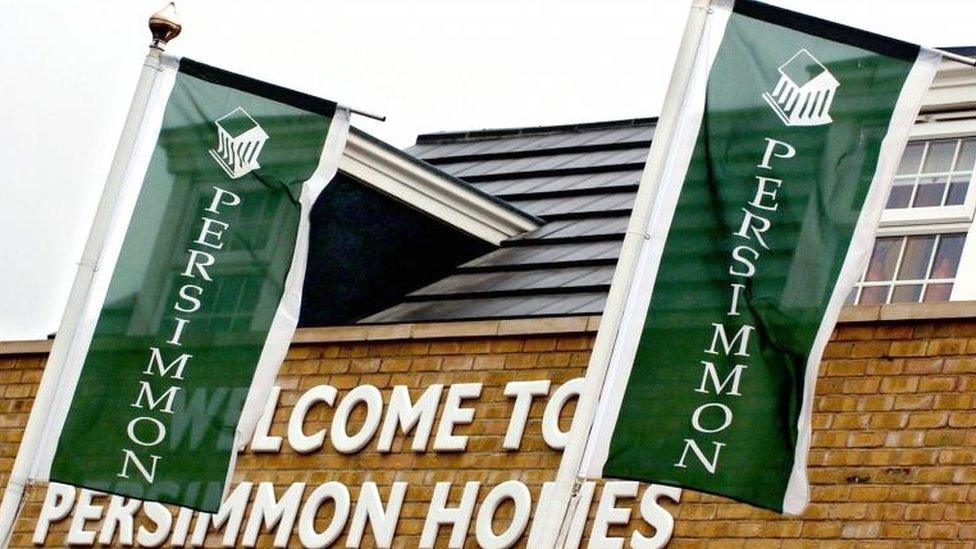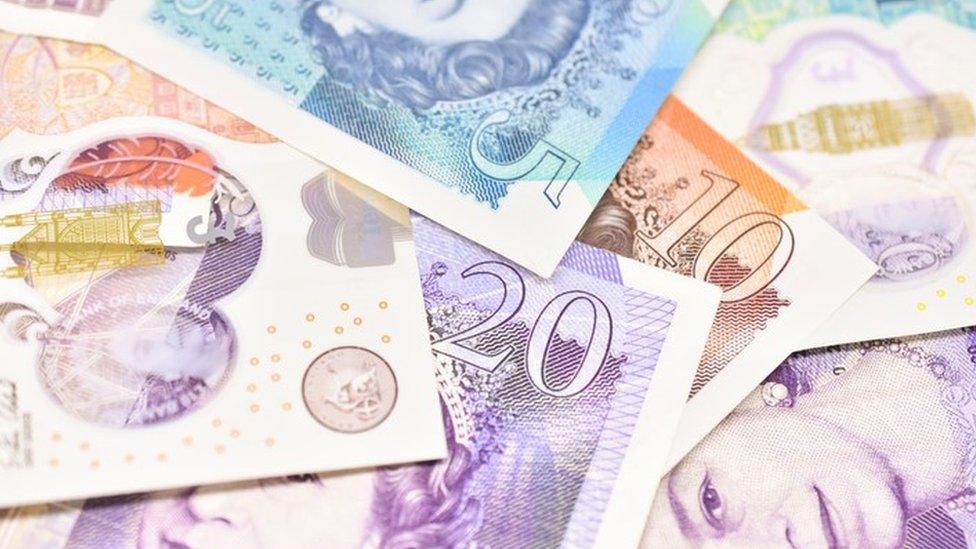Sharpened bonus points for bosses
- Published

Jeff Fairburn is due to receive £75m
Last year, Persimmon registered 16,043 new homes. For each one of these, the chief executive Jeff Fairburn "earned"' £6,857 in bonus payment.
That's not the company's profit margin on its average house, priced at 213,000. That's just one man's bonus.
The Persimmon chief agreed to cut that £110m bonus to merely £75m, meaning a bonus per new house of £4,675.
His chairman and the chairman of the company's remuneration committee both quit their posts.
They had allowed this bonus scheme to be created and implemented, without putting any ceiling on it if the share price were to rise above expectations.
Of course, Persimmon is more than a housebuilder. It is also a land speculator, buying and holding undeveloped land, and making profit as the value of it rises.
It is also one of those companies that profits from government spending. Around half of its business in recent years has been the selling of homes to first-time buyers under the UK government's Help To Buy scheme.
Persimmon's shareholders have done well out of this - £1,000 invested in 2012, when the bonus scheme began, would now be worth more than £4,100.
So that bonus-per-home measure of Mr Fairburn's market valuation is a simplistic measure.

However, it does illustrate excess as "the 1%" surge ahead of everyone else, including the second percentile. Jeff Fairburn is symbolic of an era in which inequality is one of the key drivers of public opinion and voting behaviour.
Another money man took the opportunity of the Persimmon annual general meeting to take on this culture.
Step forward Ewan Stirling, "head of stewardship" at Aberdeen Standard Investments (ASI) - the merged entity from Standard Life Investments and Aberdeen Asset Management
His title may sound like a senior role in the Church of Scotland, but it's the bit of asset management that monitors companies for governance and their wider responsibilities beyond shareholders.
Mr Stirling did what few big institutional investors do, and took his disagreement to the floor of the company's annual general meeting on Wednesday, while issuing a copy of his speech to the media.
Usually, Mr Stirling and his asset-managing ilk are courted in plush corporate offices, to reassure them about company strategy. His concerns, including those on executive pay, are quietly handled away from the view of lesser shareholders and the public.
That's what he has been doing, with Persimmon chiefs. Working with them has taken "a great deal of time in recent months". But there was no meeting of minds, so Mr Stirling brought along the full firepower of someone with a 3% stake, and let rip with both barrels.
'Grossly excessive'
Even after taking a £35m cut, the top man's bonus was "not even close to acceptable", said Mr Stirling.
The search for someone to blame - the remuneration committee or shareholders who agreed to this Long Term Incentive Plan six years ago, or the publicly funded Help to Buy scheme, or quantitative easing by the Bank of England - misses the point.
And that point, according to the ASI man, is that the reputation of Persimmon is at stake.
"Regardless of any moral or societal duties, company directors have a legal responsibility to act in the best long-term interests of the company that employs them," said Mr Stirling.
"(These) remuneration results suggest that the executive directors at Persimmon have lost sight of that, because the long-term success of the company is being endangered by the reputational damage associated with grossly excessive pay.

"I understand that the executive team at Persimmon have been very successful and are highly regarded in the industry for their technical and managerial expertise. But being a company director, and in particular a chief executive, requires more.
"It requires a broader context. It requires a personal motivation that goes beyond simply amassing a fortune. It requires an understanding of where the company sits within the society within which it operates. Little of that is evident currently at Persimmon."
Mr Stirling rightly pointed out that the housebuilder is not alone. There's a recurring theme of gargantuan executive pay packets.
So he pointed out there's a danger there, for all of business. If they don't get it under control, there are those who will happily control it for them.
"A common complaint from businesses relates to the interference of outside parties, such as politicians and regulators, who create bureaucracy and obstacles to value generation," he told the AGM.
"Unfortunately, when directors act in contravention of their role to promote the best interests of the business, they are inviting more external attention which will affect not just them, but all of their corporate peers."
Spare cash
That could include, for instance, the joint chief executives at Standard Life Aberdeen. Mr Stirling's bosses are no strangers to eye-popping bonuses.
And while Britain has populists on the right who are willing to take aim at corporate greed, it also has the prospect of Jeremy Corbyn becoming prime minister. Jeff Fairburn might find a bit more pushback from such a Labour administration.
We've been here before, of course. There have been waves of institutional shareholder activism. It was even dubbed a "shareholder spring", in tribute to the Arab variety of blossom, when it still seemed that political upheaval was positive. But they have had only a limited impact.
There's a fair chance of a return to concerns about it, driven by what's happening in the US.
One effect of the corporate tax cut, under President Trump and the Republican Congress, is that profits are boosted, and at least some of the vast oceans of spare cash - more than $1 trillion - can be taken back to America from foreign subsidiaries.
Higher profits help to boost the share prices of the companies with most to gain. And spare cash plays into the powerful tide of share buy-backs and special dividends, both of which push the share price up further.
Who benefits?
Who benefits most from a rising share price? Senior executives do. Their bonuses are paid in shares, including those at Persimmon. So they have a clear interest in prioritising dividends and buy-backs over new capital investment.
Persimmon has been showering dividends on its shareholders. Their gratitude helps explain why the directors' report on executive pay at Persimmon squeaked through the annual general meeting with a 51.5%-48.5% majority and around 30% abstention.
Others have emphasised the buy-back, which increases earnings per share and therefore makes each share automatically more valuable. Lloyds Banking Group, for instance, is spending up to £1bn of its earnings on buy-backs.
Goldman Sachs research suggests around £15bn was spent on re-purchasing of shares in the London-listed companies during last year, led by energy and finance companies.
That's not much less than the total amount raised on the London Stock Exchange to support company investments and growth.
If growth is to be the priority, it seems that different incentives are needed for the people in charge of Britain's big firms - stronger incentives to invest rather than richly rewarding shareholders, including themselves.
- Published25 April 2018
